Review of Units 6-10
文档属性
| 名称 | Review of Units 6-10 | 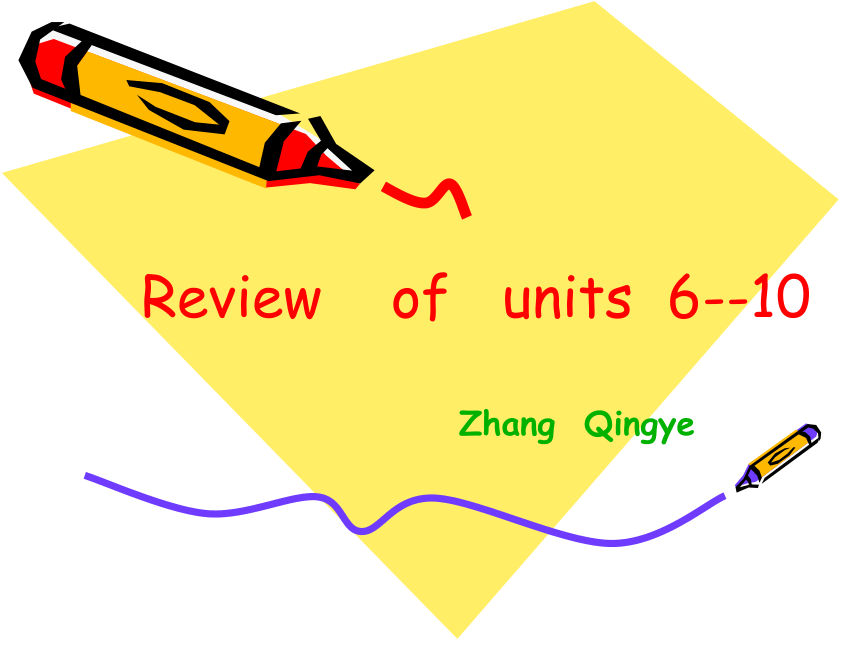 | |
| 格式 | zip | ||
| 文件大小 | 102.8KB | ||
| 资源类型 | 教案 | ||
| 版本资源 | 人教新目标(Go for it)版 | ||
| 科目 | 英语 | ||
| 更新时间 | 2013-03-20 19:48:42 | ||
图片预览

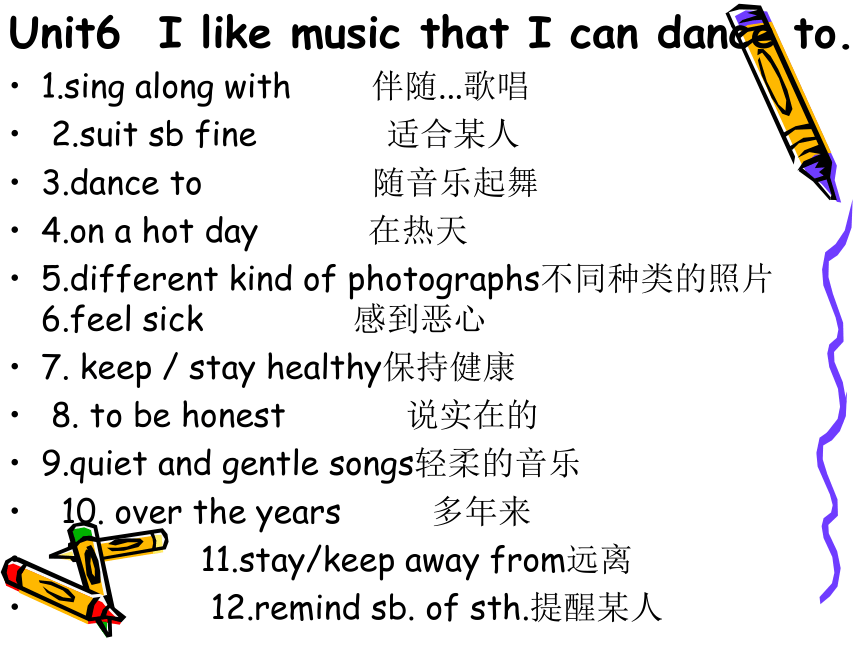
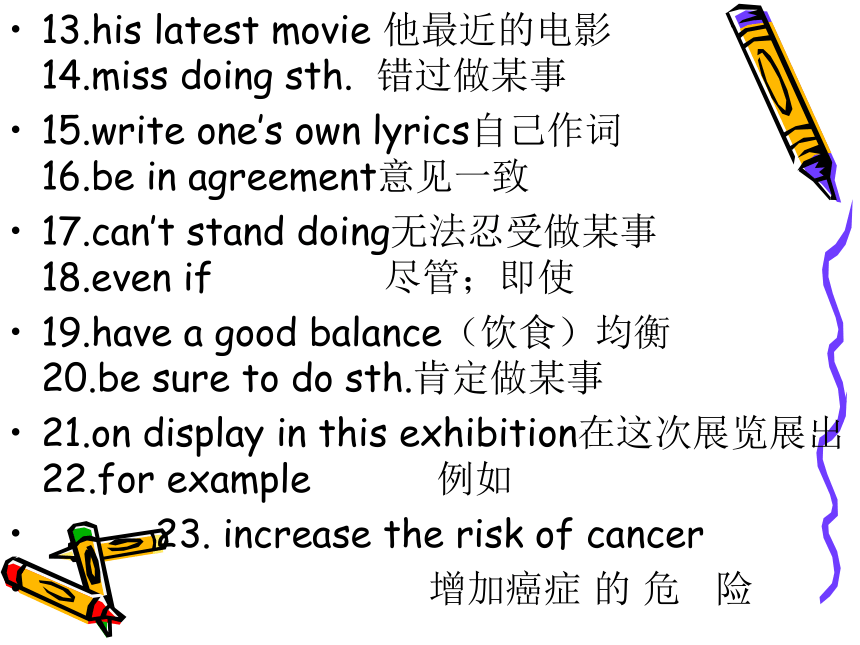
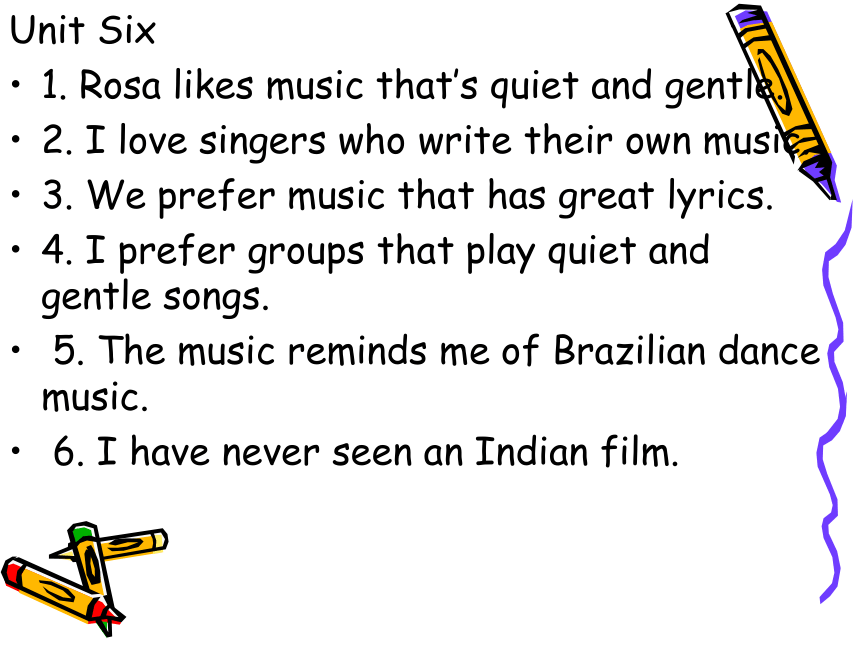
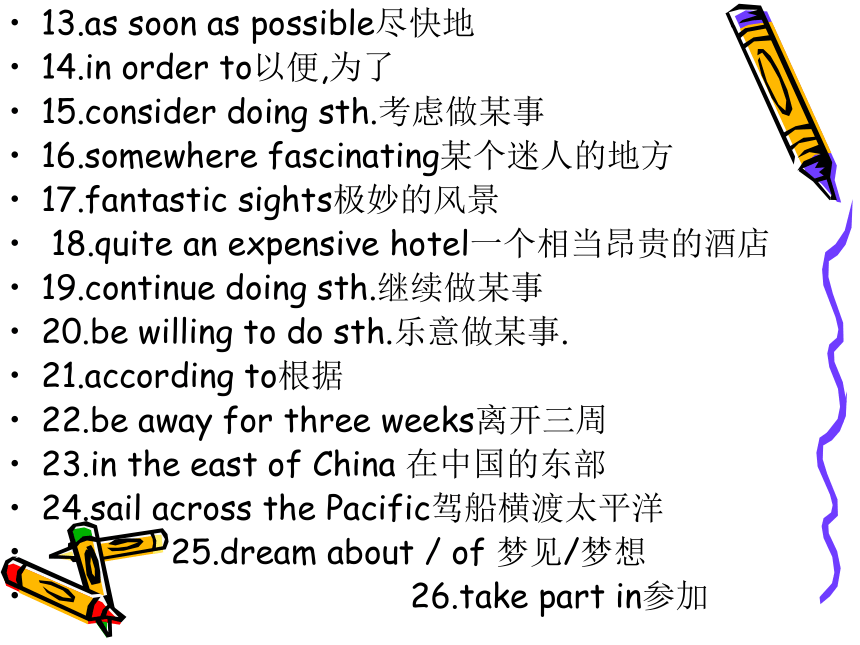

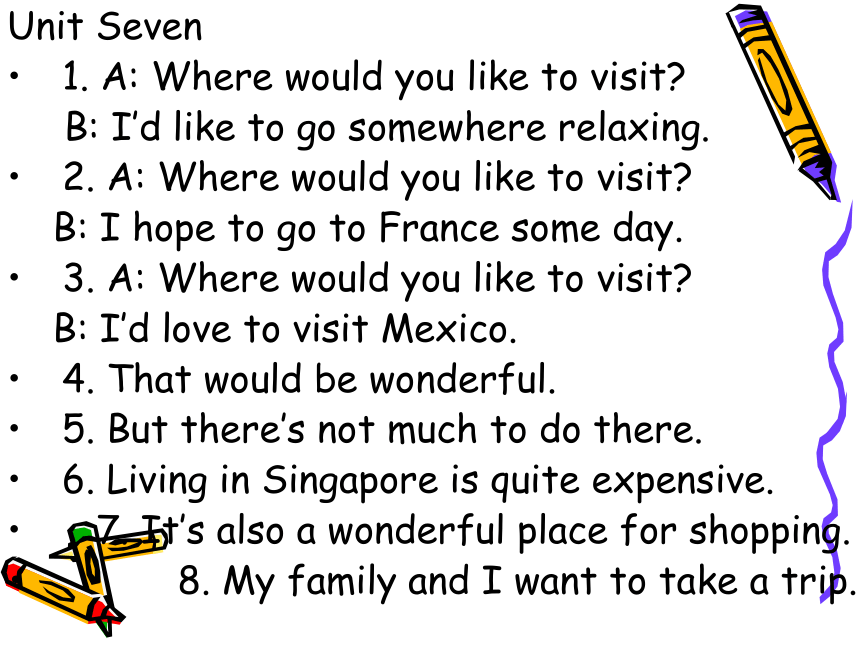
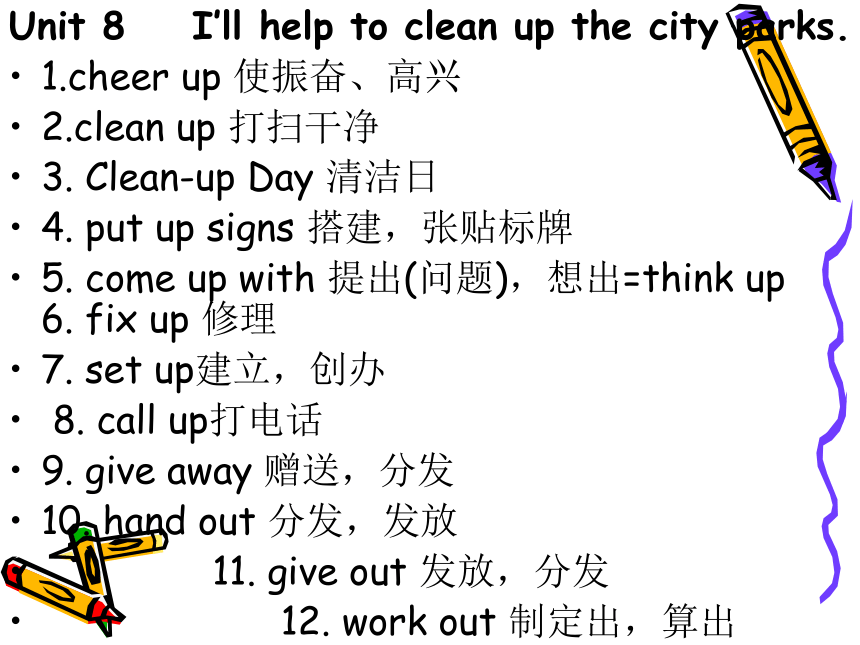
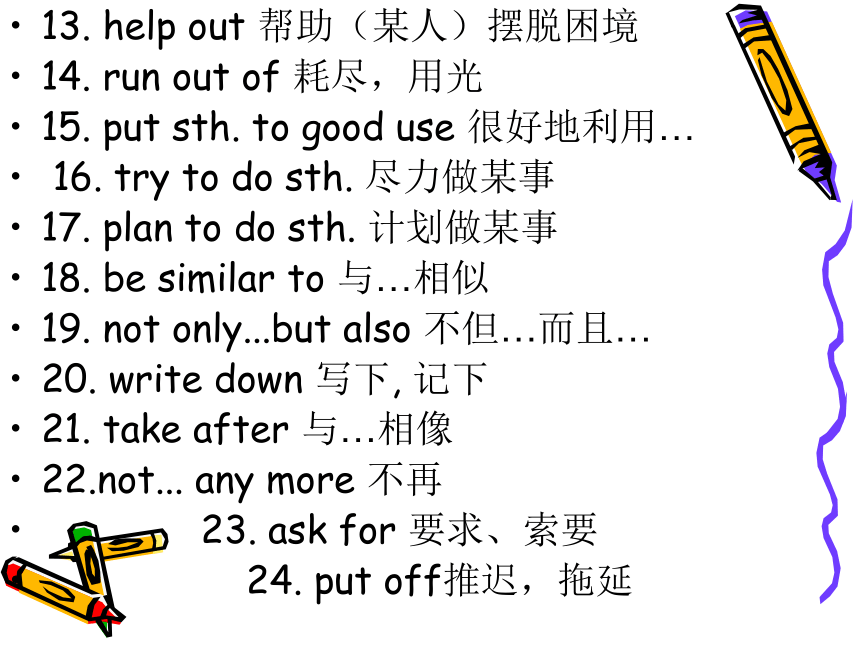
文档简介
课件24张PPT。Review of units 6--10Zhang QingyeUnit6 I like music that I can dance to.
1.sing along with 伴随...歌唱
2.suit sb fine 适合某人
3.dance to 随音乐起舞
4.on a hot day 在热天
5.different kind of photographs不同种类的照片 6.feel sick 感到恶心
7. keep / stay healthy保持健康
8. to be honest 说实在的
9.quiet and gentle songs轻柔的音乐
10. over the years 多年来
11.stay/keep away from远离
12.remind sb. of sth.提醒某人13.his latest movie 他最近的电影 14.miss doing sth. 错过做某事
15.write one’s own lyrics自己作词 16.be in agreement意见一致
17.can’t stand doing无法忍受做某事 18.even if 尽管;即使
19.have a good balance(饮食)均衡 20.be sure to do sth.肯定做某事
21.on display in this exhibition在这次展览展出 22.for example 例如
23. increase the risk of cancer
增加癌症 的 危 险
Unit Six
1. Rosa likes music that’s quiet and gentle.
2. I love singers who write their own music.
3. We prefer music that has great lyrics.
4. I prefer groups that play quiet and gentle songs.
5. The music reminds me of Brazilian dance music.
6. I have never seen an Indian film. 13.as soon as possible尽快地
14.in order to以便,为了
15.consider doing sth.考虑做某事
16.somewhere fascinating某个迷人的地方
17.fantastic sights极妙的风景
18.quite an expensive hotel一个相当昂贵的酒店
19.continue doing sth.继续做某事
20.be willing to do sth.乐意做某事.
21.according to根据
22.be away for three weeks离开三周
23.in the east of China 在中国的东部
24.sail across the Pacific驾船横渡太平洋
25.dream about / of 梦见/梦想
26.take part in参加
27.one of the most famous churches in the world
世界上最著名的教堂之一 Unit Seven
1. A: Where would you like to visit?
B: I’d like to go somewhere relaxing.
2. A: Where would you like to visit?
B: I hope to go to France some day.
3. A: Where would you like to visit?
B: I’d love to visit Mexico.
4. That would be wonderful.
5. But there’s not much to do there.
6. Living in Singapore is quite expensive.
7. It’s also a wonderful place for shopping.
8. My family and I want to take a trip. Unit 8 I’ll help to clean up the city parks.
1.cheer up 使振奋、高兴
2.clean up 打扫干净
3. Clean-up Day 清洁日
4. put up signs 搭建,张贴标牌
5. come up with 提出(问题),想出=think up 6. fix up 修理
7. set up建立,创办
8. call up打电话
9. give away 赠送,分发
10. hand out 分发,发放
11. give out 发放,分发
12. work out 制定出,算出13. help out 帮助(某人)摆脱困境
14. run out of 耗尽,用光
15. put sth. to good use 很好地利用…
16. try to do sth. 尽力做某事
17. plan to do sth. 计划做某事
18. be similar to 与…相似
19. not only...but also 不但…而且…
20. write down 写下, 记下
21. take after 与…相像
22.not... any more 不再
23. ask for 要求、索要
24. put off推迟,拖延
Unit Eight
1. He looks sad. Let’s cheer him up.
2. We’re going to set up a food bank to help hungry people.
3. We need to come up with some ideas.
4. We can’t put off making a plan.
5. You could volunteer in an after-school study program.
6. I take after my father.
7. Your parents must be proud of you.
8. I need to come up with some ways of
getting money. 动词短语
1.“动词+副词”
常见短语:give back, put off, find out, turn on, turn off, turn on, take off, give up, pick up, write down,
宾代副前,宾名副前后
2. “动词+介词”
常见短语:look for, look after,
send for, worry about,
wait for, hear fromUnit 9 When was it invented?
1. be used for 被用来做…
2. be used to doing sth. 习惯于做某事
3. according to 根据,按照
4. in this way 这样
5. help sb. do sth. 帮助某人做某事
6. by accident 偶然的
7.by mistake 错误的
8. in the end= at last=finally 最后 9. make the customer happy使顾客开心
10.fall into 落入,陷入
11. a chef called Black一个叫布莱克的厨师
12. sprinkle a lot of salt on chips
在薯片上洒大量的盐
13. decide to do sth.决定做某事14. not…until 直到…才
15. over three thousand years三千年以上
16. produce a pleasant smell产生一股令人愉快的气味
17. over an open fire. 在明火上
18.at college 在大学
19. in nineteenth century在十九世纪
20.light bulb 电灯泡
21.flying disk 飞盘
22.microwave oven微波炉
23.knock into 撞上(某人)
24. taste salty 尝起来很咸
25.divide…into 把…分为…
26.the number of …的数量
27.an ancient Chinese legend
一个中国古代传说
Unit Nine
1. A: When was the car invented?
B: It was invented in 1885.
2. A: When were the electric slippers invented?
B: They were invented last year.
3. A: Who were they invented by?
B: They were invented by Julie Thompson.
4. A: What are they used for?
B: They’re used for seeing in the dark.
5. Some friends of mine had one TV set.
6. In this way, one of the world’s favorite
drinks was invented.The passive voice.被动语态 英语中动词有主动语态和被动语态两种语态. 主动语
态表示主语是动作的执行者,被动语态表示主语是动作的
承受者, 在被动语态中动作的执行者有时用by短语表示
出来.被动语态的构成:助动词be+ (及物动词的) 过去分词 一般现在时一般过去时一般现在时: am / is / are done
一般过去时: was / were done
现在进行时: am / is / are being done
过去进行时: was / were being done
现在完成时: have / has been done
过去完成时: had been done
一般将来时: shall / will be done ;
be going to be done
当句中含有情态动词时,句子结构为 can / must / have to…be done1带复合宾语的被动语态结构.(1)make sb. do sth. sb. be made to do sth.Mr Green made Jim do his homework at home.Jim was made to do his homework by Mr Green at home.watch let have
hear see noticeUnit10
1.by the time 到…时候为止
2.get outside 到外边
3.get into the shower 去洗澡
4.start doing / to do sth. 开始做某事
5.be late for 迟到
6.go off (闹钟)闹响
7.wake up 醒来
8.come out 出来,出现
9.run off 迅速离开,跑掉
10.on time 准时
11.in time 及时
12.come by (走)过来
13.give sb. a ride 让某人搭车
14.break down 损坏,坏掉15.show up 出席,露面
16sth. happen to sb. 某事发生在某人身上
17.stay up 熬夜
18.wait for sb. to do sth.等某人做某事
19.so …that … 如此…以至于
20.set off 出发,开始
21.April Fool‘s Day 愚人节
22.a costume party 一个化装舞会
23.get married 结婚
24.marry sb. 与某人结婚
25.get dressed 穿好衣服
26.on the first day 在第一天
27.make it成功了,做成了
28. sold out卖完,售光
Unit Ten
1. By the time she got up, her brother had already gone into the bathroom.
2. By the time she went outside, the bus had already gone.
3. By the time she got to class, the teacher had already started teaching.
4. When she got to school, she realized she had left her backpack at home.
5. I don’t want to stay up too late. The Past Perfect Tense 过去完成时过去完成时的构成
助动词 had (用于各种人称和数) + 过去分词When I got to school, the bell had rung.2. 过去完成时的用法:
主要是表示在过去某个时间,或是动作之前
已经发生或完成的动作.也就是过去的过去.The Past Perfect Tense 过去完成时3. 常用的几种方式:
用介词by, before 等构成的时间短语.
用连词when, before, after或者短语by the time
引导的时间状语从句.We had learnt 20 English songs by the end
of last month.
The plane had taken off when I reached the
airport.
By the time I got up , my brother had left home.
Thank you!Bye-bye
1.sing along with 伴随...歌唱
2.suit sb fine 适合某人
3.dance to 随音乐起舞
4.on a hot day 在热天
5.different kind of photographs不同种类的照片 6.feel sick 感到恶心
7. keep / stay healthy保持健康
8. to be honest 说实在的
9.quiet and gentle songs轻柔的音乐
10. over the years 多年来
11.stay/keep away from远离
12.remind sb. of sth.提醒某人13.his latest movie 他最近的电影 14.miss doing sth. 错过做某事
15.write one’s own lyrics自己作词 16.be in agreement意见一致
17.can’t stand doing无法忍受做某事 18.even if 尽管;即使
19.have a good balance(饮食)均衡 20.be sure to do sth.肯定做某事
21.on display in this exhibition在这次展览展出 22.for example 例如
23. increase the risk of cancer
增加癌症 的 危 险
Unit Six
1. Rosa likes music that’s quiet and gentle.
2. I love singers who write their own music.
3. We prefer music that has great lyrics.
4. I prefer groups that play quiet and gentle songs.
5. The music reminds me of Brazilian dance music.
6. I have never seen an Indian film. 13.as soon as possible尽快地
14.in order to以便,为了
15.consider doing sth.考虑做某事
16.somewhere fascinating某个迷人的地方
17.fantastic sights极妙的风景
18.quite an expensive hotel一个相当昂贵的酒店
19.continue doing sth.继续做某事
20.be willing to do sth.乐意做某事.
21.according to根据
22.be away for three weeks离开三周
23.in the east of China 在中国的东部
24.sail across the Pacific驾船横渡太平洋
25.dream about / of 梦见/梦想
26.take part in参加
27.one of the most famous churches in the world
世界上最著名的教堂之一 Unit Seven
1. A: Where would you like to visit?
B: I’d like to go somewhere relaxing.
2. A: Where would you like to visit?
B: I hope to go to France some day.
3. A: Where would you like to visit?
B: I’d love to visit Mexico.
4. That would be wonderful.
5. But there’s not much to do there.
6. Living in Singapore is quite expensive.
7. It’s also a wonderful place for shopping.
8. My family and I want to take a trip. Unit 8 I’ll help to clean up the city parks.
1.cheer up 使振奋、高兴
2.clean up 打扫干净
3. Clean-up Day 清洁日
4. put up signs 搭建,张贴标牌
5. come up with 提出(问题),想出=think up 6. fix up 修理
7. set up建立,创办
8. call up打电话
9. give away 赠送,分发
10. hand out 分发,发放
11. give out 发放,分发
12. work out 制定出,算出13. help out 帮助(某人)摆脱困境
14. run out of 耗尽,用光
15. put sth. to good use 很好地利用…
16. try to do sth. 尽力做某事
17. plan to do sth. 计划做某事
18. be similar to 与…相似
19. not only...but also 不但…而且…
20. write down 写下, 记下
21. take after 与…相像
22.not... any more 不再
23. ask for 要求、索要
24. put off推迟,拖延
Unit Eight
1. He looks sad. Let’s cheer him up.
2. We’re going to set up a food bank to help hungry people.
3. We need to come up with some ideas.
4. We can’t put off making a plan.
5. You could volunteer in an after-school study program.
6. I take after my father.
7. Your parents must be proud of you.
8. I need to come up with some ways of
getting money. 动词短语
1.“动词+副词”
常见短语:give back, put off, find out, turn on, turn off, turn on, take off, give up, pick up, write down,
宾代副前,宾名副前后
2. “动词+介词”
常见短语:look for, look after,
send for, worry about,
wait for, hear fromUnit 9 When was it invented?
1. be used for 被用来做…
2. be used to doing sth. 习惯于做某事
3. according to 根据,按照
4. in this way 这样
5. help sb. do sth. 帮助某人做某事
6. by accident 偶然的
7.by mistake 错误的
8. in the end= at last=finally 最后 9. make the customer happy使顾客开心
10.fall into 落入,陷入
11. a chef called Black一个叫布莱克的厨师
12. sprinkle a lot of salt on chips
在薯片上洒大量的盐
13. decide to do sth.决定做某事14. not…until 直到…才
15. over three thousand years三千年以上
16. produce a pleasant smell产生一股令人愉快的气味
17. over an open fire. 在明火上
18.at college 在大学
19. in nineteenth century在十九世纪
20.light bulb 电灯泡
21.flying disk 飞盘
22.microwave oven微波炉
23.knock into 撞上(某人)
24. taste salty 尝起来很咸
25.divide…into 把…分为…
26.the number of …的数量
27.an ancient Chinese legend
一个中国古代传说
Unit Nine
1. A: When was the car invented?
B: It was invented in 1885.
2. A: When were the electric slippers invented?
B: They were invented last year.
3. A: Who were they invented by?
B: They were invented by Julie Thompson.
4. A: What are they used for?
B: They’re used for seeing in the dark.
5. Some friends of mine had one TV set.
6. In this way, one of the world’s favorite
drinks was invented.The passive voice.被动语态 英语中动词有主动语态和被动语态两种语态. 主动语
态表示主语是动作的执行者,被动语态表示主语是动作的
承受者, 在被动语态中动作的执行者有时用by短语表示
出来.被动语态的构成:助动词be+ (及物动词的) 过去分词 一般现在时一般过去时一般现在时: am / is / are done
一般过去时: was / were done
现在进行时: am / is / are being done
过去进行时: was / were being done
现在完成时: have / has been done
过去完成时: had been done
一般将来时: shall / will be done ;
be going to be done
当句中含有情态动词时,句子结构为 can / must / have to…be done1带复合宾语的被动语态结构.(1)make sb. do sth. sb. be made to do sth.Mr Green made Jim do his homework at home.Jim was made to do his homework by Mr Green at home.watch let have
hear see noticeUnit10
1.by the time 到…时候为止
2.get outside 到外边
3.get into the shower 去洗澡
4.start doing / to do sth. 开始做某事
5.be late for 迟到
6.go off (闹钟)闹响
7.wake up 醒来
8.come out 出来,出现
9.run off 迅速离开,跑掉
10.on time 准时
11.in time 及时
12.come by (走)过来
13.give sb. a ride 让某人搭车
14.break down 损坏,坏掉15.show up 出席,露面
16sth. happen to sb. 某事发生在某人身上
17.stay up 熬夜
18.wait for sb. to do sth.等某人做某事
19.so …that … 如此…以至于
20.set off 出发,开始
21.April Fool‘s Day 愚人节
22.a costume party 一个化装舞会
23.get married 结婚
24.marry sb. 与某人结婚
25.get dressed 穿好衣服
26.on the first day 在第一天
27.make it成功了,做成了
28. sold out卖完,售光
Unit Ten
1. By the time she got up, her brother had already gone into the bathroom.
2. By the time she went outside, the bus had already gone.
3. By the time she got to class, the teacher had already started teaching.
4. When she got to school, she realized she had left her backpack at home.
5. I don’t want to stay up too late. The Past Perfect Tense 过去完成时过去完成时的构成
助动词 had (用于各种人称和数) + 过去分词When I got to school, the bell had rung.2. 过去完成时的用法:
主要是表示在过去某个时间,或是动作之前
已经发生或完成的动作.也就是过去的过去.The Past Perfect Tense 过去完成时3. 常用的几种方式:
用介词by, before 等构成的时间短语.
用连词when, before, after或者短语by the time
引导的时间状语从句.We had learnt 20 English songs by the end
of last month.
The plane had taken off when I reached the
airport.
By the time I got up , my brother had left home.
Thank you!Bye-bye
同课章节目录
- Unit 1 How can we become good learners.
- Section A
- Section B
- Unit 2 I think that mooncakes are delicious!
- Section A
- Section B
- Unit 3 Could you please tell me where the restroom
- Section A
- Section B
- Unit 4 I used to be afraid of the dark.
- Section A
- Section B
- Unit 5 What are the shirts made of?
- Section A
- Section B
- Review of Units 1-5
- Unit 6 When was it invented?
- Section A
- Section B
- Unit 7 Teenagers should be allowed to choose their
- Section A
- Section B
- Unit 8 It must belong to Carla.
- Section A
- Section B
- Unit 9 I like music that I can dance to.
- Section A
- Section B
- Unit 10 You're supposed to shake hands.
- Section A
- Section B
- Review of Units 6-10
- Unit 11 Sad movies make me cry.
- Section A
- Section B
- Unit 12 Life is full of the unexpected
- Section A
- Section B
- Unit 13 We're trying to save the earth!
- Section A
- Section B
- Unit 14 I remember meeting all of you in Grade 7.
- Section A
- Section B
- Review of Units 11-14
